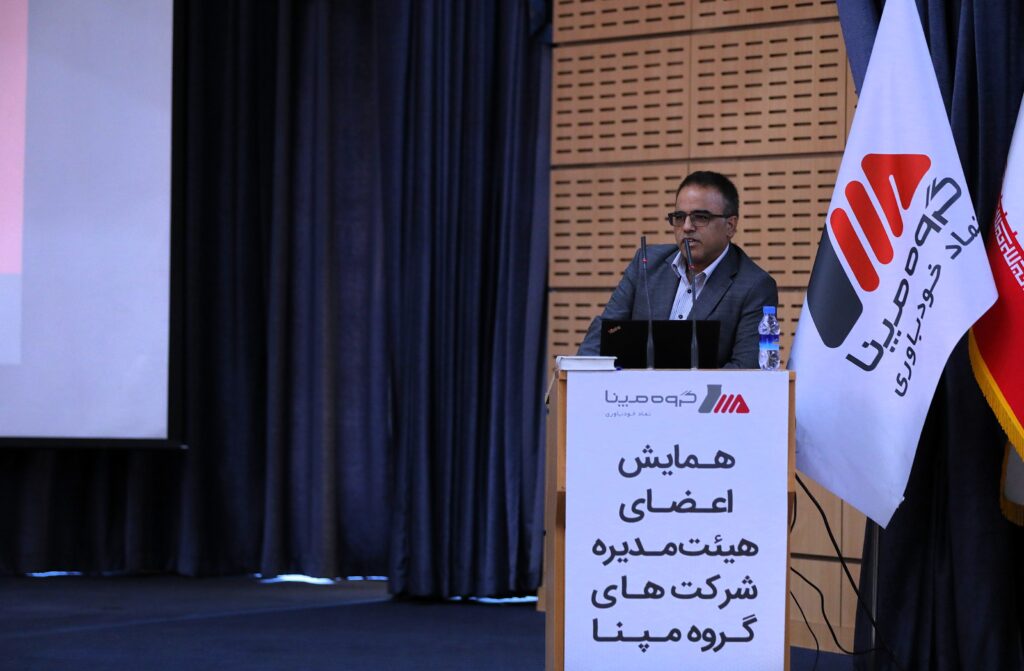MAPNA Group organized a gathering of its subsidiary companies’ board members on August 30, 2025, at Iran’s Water and Power Resources Development Company. The meeting delved into corporate governance, essential company pillars, and transparent financial and economic management across the group.
Addressing the event, MAPNA Group President Mohammad Owliya highlighted MAPNA’s industrial standing and described the group’s responsibilities as “highly significant” due to societal expectations.
He stressed that while “the board of directors has full authority to manage the company,” it must “continuously and promptly consider shareholder concerns”—noting the board’s role as their representative, as stated in the by-law.
He identified MAPNA’s core strength as “interconnection and synergy,” adding that general organizational regulations must be conveyed to subsidiaries as policy, and must also comply with legal requirements.
He defined two principal roles of the boards of directors: “oversight” and “coordination to foster synergy.” He warned that “without synergy across various units, efficiency may decline.” Thus, board members are chosen not only for their competence but also for their “ability to synergize and professionally interact” to generate value.
He went on to discuss structural developments within the conglomerate, announcing that MAPNA’s power and water holding, oil and gas holding, transportation holding, and MAPNA Iranian Power Plant Management Group have each officially begun operations by forming their own boards.
New Corporate Governance and Unified Decision-Making at MAPNA
MAPNA’s Vice President, Alireza Yazdizadeh, likened the most complex engineering systems to a state-space model, saying even non-engineering challenges like company growth can be addressed through this framework—though far more complicated due to greater variables, uncertainty, and qualitative data.
He traced MAPNA’s strategic planning maturation: in the 2000s, the system relied on Roland Berger methods; in the 2010s, it was revamped using Palladium’s consulting, transferring and localizing strategic know-how; later, Palladium and BCG models were combined effectively.
He noted that this adapted hybrid model and locally refined strategy roadmap are among the best tools for business strategy execution. Given the country’s changing conditions, scenario analysis is inevitably used in strategy formation and updates, he noted.
Introducing the conglomerate’s corporate control system, he highlighted its role particularly amid complex, challenging times. He said a well-designed control system enables reasonable decentralization within the group, yielding positive results today.
Yazdizadeh reviewed common stewardship strategy models, value-creation levers, and value destruction factors. He stressed that the suitable style of stewardship for MAPNA’s specialist holdings is the MAPNA-adapted “strategic guidance” or “functional leadership.”
He outlined the group’s value chain, noting that, except for operational management, all functions are handled by the sector (holding), subsidiaries, or independent companies; the headquarters remains focused on policy and support oversight.
In closing, he explained the system’s redefined structure—differentiating headquarters, support functions, specialist holding, and independent holding/company roles.
To ensure proper execution, aligned decision-making, and risk management, MAPNA now has two high-level oversight committees over boards—one at the headquarters level and one at the holding level—alongside prior oversight tools, according to Yazdizadeh.
Departments of Strategic Planning & Control, Economic & Financial, and Shareholders’ Assemblies will form the three pillars of the main oversight committee, he said.




The Board Role in Subsidiaries: Legal and Ethical Obligations
Next, MAPNA Group’s Economic and Financial Deputy, Ahmad-Reza Farasat, reviewed the role and responsibilities of board members at subsidiary companies, underscoring corporate governance, board members’ legal position, responsibilities, roles, and ethical traits.
He emphasized the conglomerate’s financial transparency and stated that corporate governance—including the board of directors—must consider internal and external factors.
He said the board must ensure that “corporate governance policy, strategies, risk management, accountability and transparency are properly and effectively implemented by executive managers”.
Farasat elaborated on provisions from the Commercial Code, clarifying the legal standing and authority of boards in policy-making, direction, and oversight, whilst adhering to MAPNA Group’s requirements.
He stressed the necessity that board members remain aware of their legal, civil, and criminal liabilities in decision-making and policy development, and always keep efficiency, effectiveness, and economic rationality in mind.
